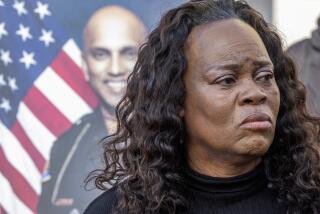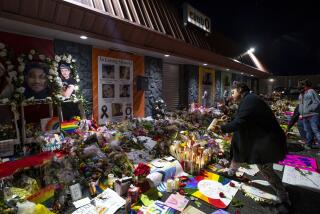Murder Leads to Protection for Gays : Hate crime: ‘Q Patrol’ officers now escort bar patrons to their cars. Police are given credit for a safer neighborhood.
- Share via
HOUSTON — Paul Broussard was stabbed to death outside a gay bar in Houston, allegedly by 10 teen-agers who wanted to “beat up fags.”
The banker’s slaying stirred Houston’s homosexual community to activism, made the rest of the city more aware of violence against homosexuals, and focused police attention on “gay bashing.”
Eight months after the killing, gay activists say the streets have become safer in the Montrose neighborhood where many of Houston’s estimated 150,000 to 200,000 homosexuals live.
“The police in Houston have been really wonderful. I feel that things have improved,” said gay activist Ray Hill.
“The police department has been very receptive and very understanding, and they no longer consider this an imaginary problem,” Chris Bacon, president of the Gay and Lesbian Political Caucus, said.
Broussard and two friends were attacked by a group of young men wielding pipes and nail-studded boards after leaving a Montrose nightclub July 4. Broussard, 27, died of stab wounds.
Ten teen-agers from The Woodlands, an affluent Houston suburb, were arrested in the attack and charged with murder. Police said the teen-agers told them they wanted to “beat up some fags.”
The first defendant, John Christopher Buice, 17, is scheduled to go on trial Monday. He could be sentenced to life in prison on the first-degree murder charge, said Harris County assistant district attorney Mike Anderson.
“We want to put this case to the jury to give us an idea and give the community an idea what the response is to this kind of crime,” Anderson said.
Buice’s attorney, Tim Gavrel, did not return repeated telephone calls from The Associated Press.
The slaying galvanized the gay community into demanding police reforms. A protest rally days after the killing drew more than 1,000 people.
Police responded by organizing an undercover sting operation in which officers posed as homosexuals.
During the 15 days of “Operation Vice Versa,” five undercover officers were attacked--sprayed with Mace and hit with a baseball bat and a tree branch.
One policeman was punched in the face by a man who apologized after his arrest, saying he had thought the officer was “a damn queer.”
Since then, homosexuals have worked with police to set up training programs to make officers and cadets aware of gay issues.
And late last year, police helped organized the Montrose-based “Q Patrol,” whose members escort patrons of gay bars to their cars, said Assistant Police Chief Frank Yorek.
Yorek cited the patrol as a good example of “police-citizen crime fighting.”
“I think they will continue to fight back--and, unfortunately, will continue to be victimized,” he said.
Gay activists, meanwhile, say the slaying finally made the whole community aware of violence against homosexuals.
“I think in the past it was something that was talked about in gay establishments, among gay people,” Bacon said.
Knight said her organization was flooded with sympathetic telephone calls--most from people who identified themselves as heterosexual.
“It’s not a gay-and-straight issue. It has to do with hate and bias to people,” she said.
And Hill told of being invited to speak to church and parent groups in the defendants’ neighborhood.
“What I find in those communities is they are as shocked and horrified as my community,” Hill said.
More to Read
Sign up for Essential California
The most important California stories and recommendations in your inbox every morning.
You may occasionally receive promotional content from the Los Angeles Times.













